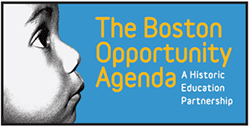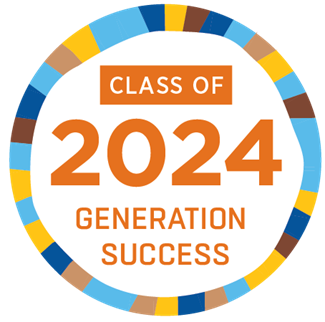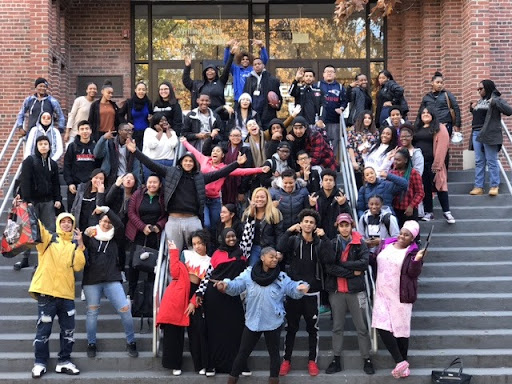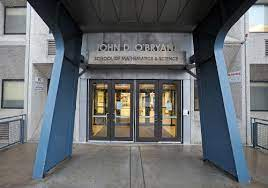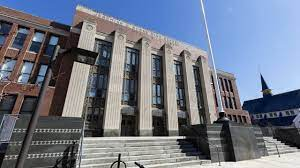For Teachers
In early 2021, Generation Success partnered with Boston Public Schools (BPS) to launch the Class of 2024 Challenge. The goal of the Challenge was to encourage ninth graders to set goals for their future – and ultimately complete their success plans through the My Career & Academic Plan (MyCAP) process. It is the belief that engagement in a multi-year planning process allows students to have more control over their education and connect what they are doing now to their future selves.
The Class of 2024 Challenge brought together students with caring adults, including school counselors, teachers and administrators to begin their plans. Following the Challenge, we saw the rate of MyCAP grade 9 engagement double from 2020 to 2021! Inspired by these gains in preparing students for college, career and life after high school, we decided to make the Challenge an annual event and help shape MyCAP implementation moving forward. Ahead of our next Challenge, Generation Success is excited to bring in even more schools to join the fun.
Here are lessons learned from three high schools that participated in last year’s Challenge. Each school launched different techniques during a hybrid learning year to increase MyCAP participation from ninth graders. They shared recommended tips for school leaders implementing MyCAP plans, in hopes that the next Class Challenge will encourage an even greater number of students to think ahead, engage in conversations and set goals for life after high school.
What did we learn from the Class of 2024 Challenge?
Edward M. Kennedy for Health Careers (EMK)
Jennifer Barefoot Smith, School Counselor for 9th & 10th grade
“Learning about the connection between subject-specific content and corresponding professions is imperative to our students' self discovery. We must dedicate time and space in the classroom for in-depth conversations on what pathways can look like for different careers, interests and skills.”
At EMK, Jennifer Barefoot Smith worked persistently alongside teachers to increase MyCAP participation and completion rates in 2021. Despite a mostly remote learning environment, teachers offered class time to allow Jennifer to share her screen and walk through Naviance over Zoom, and answer questions with students. Specific subject-areas further provided incentives for completing each task, like PE and Wellness classes, which gave extra credit to students for MyCAP completion. Jennifer tracked and monitored student progress, assisted teachers with adding extra credit in gradebooks – and emailed students directly who were absent from instruction. When EMK returned to part-time learning in-person, Jennifer also followed-up with students at school who had not yet completed their MyCAP tasks. While this persistence greatly supported the school’s work to increase completion rates, they look forward to next year where EMK can continue to increase their numbers and have more meaningful one-on-one conversations with students on how to build a successful life after high school.
Top 3 Takeaways from EMK:
- Relationship building between counselors, teachers, parents and students is imperative in connecting students to programs that can further their growth and evaluate their options starting in ninth grade. MyCap provides one vehicle to do this.
- Students listen and trust out-of-school programs, like Big Brothers and Sisters. Incorporate these out-of-school programs more formally into the planning process as partners in engaging students and motivating them to not only complete their MyCAP, but have meaningful conversations with trusted adults and mentors.
- Consistency is key. Identify built-in times to review Naviance with students (i.e., dedicated class time) and follow-up with students weekly – either in person or over email – to ensure they are completing their tasks.
The John D. O’Bryant School of Mathematics and Science
Sarah Wilson, Student Development Counselor at Boston Public Schools and Nora Tsoutsis, Program Director
“When embarking on this journey, it was important to seek alignment between my administrators and the teachers. It was helpful having the support of the entire school behind this effort to help students prepare for their futures.”
The O’Bryant School created a new, tailored process for ensuring students had the time and space to understand the Naviance platform and MyCAP tasks. Student Development Counselor, Sarah Wilson, worked with teachers and administrators to divide their class of 320 ninth grade students in two groups. They met with each group on a different day and offered make-up sessions on a third day during virtual guidance blocks. During these sessions, college and career advisors introduced the MyCAP lessons and answered questions. To ensure accountability, Sarah sent exit tickets to students who attended the lesson and sent notification emails to those who did not – with reminders for both parents and students on when and how to make-up the session. As an incentive for completion, students who completed their MyCAP tasks were allowed to move forward with scheduling courses for the following semester. O’Bryant is excited to continue this process next year with students attending school in-person and hopes to host another in-school competition style process for garnering interest from students in goal-setting, and planning for the future.
Top 3 Takeaways:
- Create advisory or guidance blocks to set aside designated time to connect with your students, engage in meaningful conversations around their goals and oversee completion of assigned MyCAP tasks each week.
- Incorporate accountability measures like exit tickets or scheduling incentives to help students understand the importance of attending facilitated learning discussions.
- Provide sufficient time for activities associated with one lesson to be completed during class time and assign remaining activities for homework.
Burke High School
Courtney Valentine, 11th and 12th grade Guidance Counselor and Laylanni Camacho, Mathematics Teacher
“Through this process, we encouraged our students to really see and understand the benefits of participating in MyCAP. This is not just a history or math assignment – this will help you better understand yourself and what you want to do in life.”
Working with guidance counselors, teachers and administrators, Burke navigated a mostly remote learning year to create a strategy for MyCAP completion that reached absent students and engaged math, english and English as a Second Language (ESL) teachers across academies. During dedicated classroom time twice a week, guidance counselors virtually walked through the Naviance platform and MyCAP tasks in small groups with students, and for ultimate clarity, they shared their screens. If students were not able to complete the assignment in class, they did so as homework and received a corresponding grade or extra credit for completion. For ESL students, counselors worked with teachers directly to ensure all materials and learning exercises were also translated, as needed. The counselor’s office monitored all student completion for MyCAP tasks and sent reminder emails to both students and parents directly, and offered additional touchpoints for students to meet with counselors. As Burke plans for an in-person learning environment next year, they hope to engage more out-of-school programs and partners throughout the MyCAP process, and continue to showcase how these exercises are so important for students to lay the groundwork for their future.
Top 3 Takeaways:
- Engage your core class teachers and counselors early, and ensure that all students are equitably included in goal-setting and MyCAP discussions. Establish check-ins or touchpoints on MyCAP in advance, and put notification or reminder systems in place for both teachers and students throughout the year.
- Consider incentives for students to complete their plans, like extra credit or additional grades in core classes. This will help teachers increase engagement and participation in the tasks during dedicated class time.
- Have honest, interactive conversations with your students about how these experiences can help them understand and achieve. Walk through the demonstrations together and paint a picture of what their future could look like.
For more information about MyCAP, please visit: Bostonpublicschools.org
